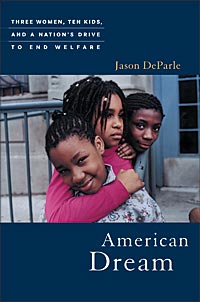
Nothing marked Bill Clinton as a new kind of Democrat more than his campaign
pledge to “end welfare as we know it.” Both blunt and
vague, the promise resonated with a view that the social safety net had become a web that ensnared
the underclass, particularly African Americans, in a gloomy pathology of dependency. Too many
of the poor, Clinton said, couldn’t even dream the American Dream.
American Dream is the melancholy title Jason DeParle of the New York Times
chose for his richly researched, beautifully written chronicle of the era that fulfilled Clinton’s
pledge. Political abstractions are juxtaposed against the personal dramas of three emblematic
unwed mothers. By the book’s end, the women have 10 children between them, and one, at age 35,
is already a grandmother. At first glance, Angie, Jewell, and Opal seem to justify all the criticisms
of the welfare system: Each new birth ensures a larger welfare check; they move from Chicago to Milwaukee
for higher benefits and cheaper rent; they take jobs without telling the welfare office. Fathers
tend to be out of the picture—two are in prison for murder.
But DeParle’s intimate reporting reveals that welfare dependence
was a symptom, not a cause, of the chaotic happenstance of their lives. On a wrenching day when Angie,
in the stirrups preparing to end an unwanted pregnancy, abruptly halts the procedure, it is clear
that the prospect of a larger check is the last thing on her mind. These women are survi- vors, scuffling
by. When Washington moves to reform welfare, they shrug it off: They’ll manage. Two do so,
marginally improving their lots. The third, with no net to catch her, finds a bleaker fate.
Welfare reform is recalled as a triumph for Clinton, whose policy benefited
from a robust economy. DeParle’s judgment: The root cause of troubles in the African American
underclass was never welfare. But nobody has figured out how to legislate fatherhood.















